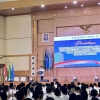Research in the field of educational management cannot be separated from the underlying paradigms of knowledge. Two main paradigms frequently applied are the scientific paradigm and the naturalistic paradigm. Both offer different perspectives in understanding educational reality, yet each plays a crucial role in the development of knowledge and practice in educational management.
The scientific paradigm is based on the assumption that reality is objective, measurable, and can be explained through general theories or laws. Scientific research applies quantitative approaches such as surveys, experiments, and statistical analysis with the aim of producing findings that can be generalized. In the context of educational management, this paradigm is useful for measuring the effectiveness of policies, assessing curriculum success, or evaluating teaching methods. With systematic and data-based results, the scientific paradigm provides a strong foundation for policymakers in making evidence-based decisions.
In contrast, the naturalistic paradigm views social and educational reality as dynamic, unique, and full of meaning. Knowledge in this paradigm is obtained through a deep understanding of human experiences, values, and interactions. Qualitative methods such as observation, interviews, and case studies are the primary tools to explore the meaning behind educational phenomena. The naturalistic paradigm does not aim for generalization but rather for rich contextual understanding, for instance, regarding leadership dynamics, school culture, or the subjective experiences of teachers and students.
The differences between the two can be seen in their ontology, epistemology, and methodology. The scientific paradigm assumes a single measurable reality, maintains distance between the researcher and the object of study to ensure objectivity, and applies quantitative methods. Meanwhile, the naturalistic paradigm assumes that reality is multiple and subjective, emphasizes closeness between the researcher and the subjects, and relies on qualitative methods.
In practice, educational management research becomes more comprehensive when integrating both paradigms. A mixed-methods approach that combines quantitative and qualitative data allows researchers not only to understand phenomena at a general level but also to capture deeper meanings behind the data. For example, the effectiveness of an educational program can be measured statistically, while the experiences of teachers and students in implementing the program can be explored through interviews or case studies.
Therefore, both scientific and naturalistic paradigms are equally important and complementary. The scientific paradigm provides an objective foundation for decision-making, while the naturalistic paradigm offers deeper insights that help interpret educational reality in a more human and contextual way. Combining the two is a strategic step to produce educational management research that is holistic, relevant, and beneficial for improving the quality of education.
Follow Instagram @kompasianacom juga Tiktok @kompasiana biar nggak ketinggalan event seru komunitas dan tips dapat cuan dari Kompasiana. Baca juga cerita inspiratif langsung dari smartphone kamu dengan bergabung di WhatsApp Channel Kompasiana di SINI







